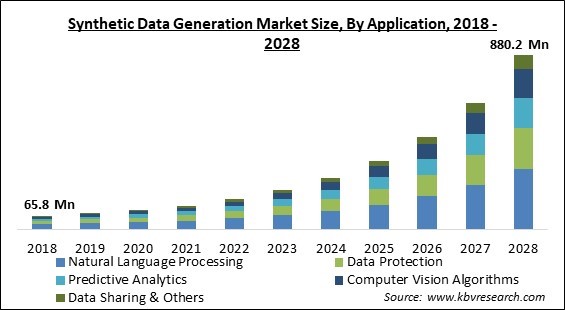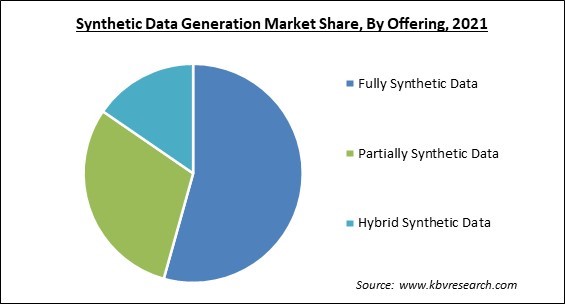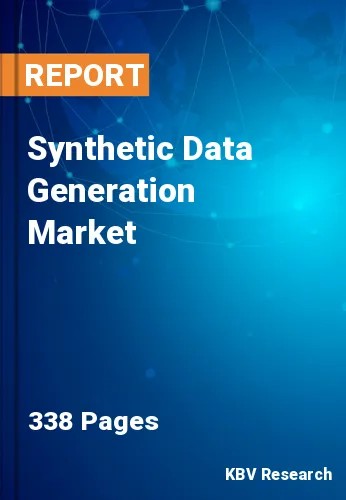The Global Synthetic Data Generation Market size is expected to reach $880.2 Million by 2028, rising at a market growth of 34.1% CAGR during the forecast period.
Synthetic data is a type of data that has been manufactured artificially for the purposes of protecting privacy, testing systems, or producing training data for artificial intelligence and machine learning algorithms. Synthetic data production is crucial because it is a key aspect of the quality of synthetic data; for instance, privacy improvement would not benefit from synthetic data that can be reverse engineered to identify real data.

As with the majority of AI-related issues, deep learning also appears in synthetic data production. Consequently, the synthetic data produced by deep learning algorithms are also utilized to enhance other deep learning algorithms. Other strategies for generating synthetic data were described, along with best practices. Synthetic data is also popular as synthetic data that may be used to train AI models in place of actual data.
In response to the increasing prevalence of the privacy-protection solution, the need for simulated data has risen among industry participants. In addition, the exponential growth of machine learning has turned the focus to synthetic data. Utilizing machine learning and AI technology, artificial data access large data sets. The need to comply with privacy legislation, especially GDPR, bodes favorably for the portfolios of major corporations preparing to expand.
The COVID-19 pandemic significantly damaged a number of businesses as well as several industries. Various economies throughout the world were majorly demolished due to the abrupt emergence of the pandemic. Lockdowns imposed by governments in order to stop the spread of the coronavirus also disrupted a number of industrial processes. Various companies were temporarily closed as a result of these lockdowns. Due to this, business processes were shut in the initial period of the pandemic, which reduced the demand for AI learning models as well as synthetic data. Hence, the growth of the synthetic data market was gradually disrupted during the COVID-19 outbreak.
Good quality synthetic data represents the real data accurately. Therefore, it can be utilized as a drop-in replacement for sensitive performance data within non-production environments, like AI training, analytics, and software testing or development. Companies employ synthetic data versions of patient experiences, customer databases, medical information, and transaction data to make data-driven choices while customer privacy. Synthetic data is an industry-agnostic solution that is utilized in numerous industries, including banking, healthcare, insurance, and telecommunications.
This significance as well as the utilization of AI and ML is increasing at an exponential rate in the modern era. However, when organizations employ third-party AI and machine learning technologies, data for AI training is frequently difficult to acquire. It may be very challenging to receive customers' consent to the use of their data for analytics; the remaining data and insights are secured. Sensitive data is frequently off-limits to both internal data science teams and external AI or analytics suppliers due to privacy concerns. Even when the data is accessible, data quality remains a problem.
Good synthetic data claims to be practically indistinguishable from authentic data while maintaining privacy. However, large amounts of sensitive information continue to leak. If the original data has outliers that are recorded by a competent data synthesizer, these features would inevitably be replicated in the synthetic data. These unique data points can be easily identified as belonging to the original dataset, resulting in a data leak. In addition, the models employed to generate synthetic data are susceptible to particular attacks.
Based on Data Type, the Synthetic Data Generation Market is segregated into Tabular Data, Text Data, Image & Video Data, and Other. In 2021, the tabular data segment acquired the largest revenue share of the synthetic data generation market. The growth of the segment is rapidly rising due to researchers' optimistic demand. The rise in the growth of the segment is majorly attributed to frequent product launches in the market.
On the basis of Modelling Type, the Synthetic Data Generation Market is bifurcated into Direct Modeling and Agent-based Modeling. In 2021, the direct modeling segment recorded a substantial revenue share of the synthetic data generation market. Direct modeling is an efficient, rapid, and uncomplicated method for exploring ideas and layout variations, particularly during the conceptual phase of a design project. Direct modeling, or Shapr3D in particular, is easy to take up and understand.
By Offering, the Synthetic Data Generation Market is segmented into Fully Synthetic Data, Partially Synthetic Data, Hybrid Synthetic Data. In 2021, the hybrid synthetic data segment registered a substantial revenue share of the synthetic data generation market. The growth of the segment is majorly owing to the fact that this type of synthetic data blends real and synthetic information, which allows the data generator to make more precise data. Hybrid synthetic data combines random records from a genuine dataset with synthetic records that closely match them.

On the basis of Application, the Synthetic Data Generation Market is categorized into Data Protection, Data Sharing, Predictive Analytics, Natural Language Processing, Computer Vision Algorithms, and Others. In 2021, the natural language processing segment witnessed the largest revenue share of the synthetic data generation market. The usage of synthetic data has increased exponentially in natural language processing as it facilitates the development of new language releases. For example, Amazon launched versions of Alexa in Hindi, Spanish, and Brazilian Portuguese in 2019.
By End-User, the Synthetic Data Generation Market is classified into BFSI, Healthcare & Life Sciences, Transportation & Logistics, IT & Telecommunication, Retail and E-commerce, Manufacturing, Consumer Electronics, and Others. In 2021, the retail and E-commerce segment witnessed a significant revenue share of synthetic data generation. The retail and e-commerce industries have received a boost from artificial data in order to train AI models and speed data sharing within and beyond the firm.
| Report Attribute | Details |
|---|---|
| Market size value in 2021 | USD 118 Million |
| Market size forecast in 2028 | USD 880.2 Million |
| Base Year | 2021 |
| Historical Period | 2018 to 2020 |
| Forecast Period | 2022 to 2028 |
| Revenue Growth Rate | CAGR of 34.1% from 2022 to 2028 |
| Number of Pages | 338 |
| Number of Tables | 590 |
| Report coverage | Market Trends, Revenue Estimation and Forecast, Segmentation Analysis, Regional and Country Breakdown, Companies Strategic Developments, Company Profiling |
| Segments covered | Application, Offering, Data Type, Modeling Type, End-use, Region |
| Country scope | US, Canada, Mexico, Germany, UK, France, Russia, Spain, Italy, China, Japan, India, South Korea, Singapore, Malaysia, Brazil, Argentina, UAE, Saudi Arabia, South Africa, Nigeria |
| Growth Drivers |
|
| Restraints |
|
Region-Wise, the Synthetic Data Generation Market is analyzed across North America, Europe, Asia-pacific, and LAMEA. In 2021, North America held the largest revenue share of the synthetic data generation market. The United States and Canada have emerged as attractive regions as end-use industries have demonstrated a growing preference for fraud detection, natural language processing, and picture data.
Free Valuable Insights: Global Synthetic Data Generation Market size to reach USD 880.2 Million by 2028
The market research report covers the analysis of key stake holders of the market. Key companies profiled in the report include Kinetic Vision, Inc. (Deep Vision Data), MOSTLY AI Solutions MP GmbH, Synthesis AI, Inc., Statice GmbH, YData, Ekobit d.o.o, Hazy Limited, Kymera-labs, MDClone Limited, and Neuromation.
By Application
By Offering
By Data Type
By Modeling Type
By End-use
By Geography
The global Synthetic Data Generation Market size is expected to reach $880.2 Million by 2028.
Higher Reliability And Explainability Within Linear Models are driving the market in coming years, however, Privacy Risks Involved With The Utilization Of Synthetic Data restraints the growth of the market.
Kinetic Vision, Inc. (Deep Vision Data), MOSTLY AI Solutions MP GmbH, Synthesis AI, Inc., Statice GmbH, YData, Ekobit d.o.o, Hazy Limited, Kymera-labs, MDClone Limited, and Neuromation.
The Fully Synthetic Data segment acquired maximum revenue share in the Global Synthetic Data Generation Market by Offering in 2021 thereby, achieving a market value of $4.7 billion by 2028.
The Agent-based Modeling segment is leading the Global Synthetic Data Generation Market by Modeling Type in 2021 thereby, achieving a market value of $5.4 billion by 2028.
The North America market dominated the Global Synthetic Data Generation Market by Region in 2021, and would continue to be a dominant market till 2028; thereby, achieving a market value of $3.4 billion by 2028.
Our team of dedicated experts can provide you with attractive expansion opportunities for your business.

